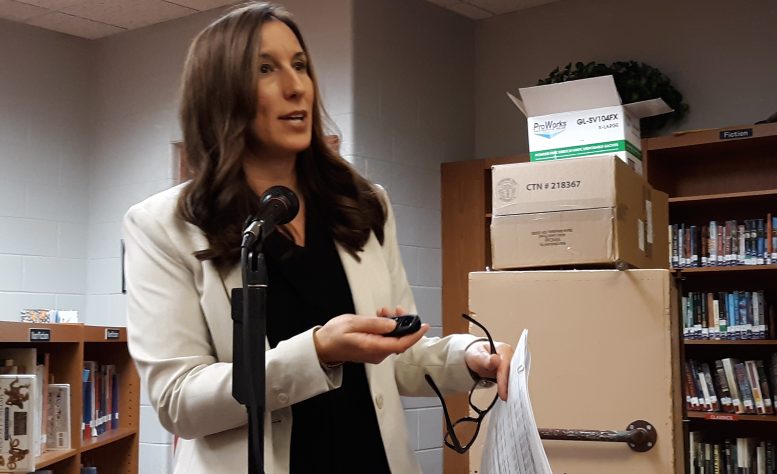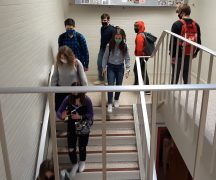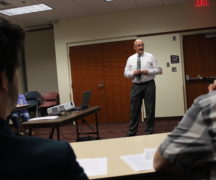By JAN LARSON McLAUGHLIN
BG Independent News
Bowling Green School Treasurer presented a picture of the district’s finances – showing that the district must be careful to not eat through its cash balance by 2025.
“This is a snapshot of today, based on what we know today,” Treasurer Cathy Schuller said Tuesday during the board of education meeting.
Since the last five-year budget forecast in May, the district has learned the following details about its finances.
First, the Rover Pipeline tax appeals continue. The pipeline company is now on its second appeal, asking that its tax responsibility be cut by 49%. A hearing is scheduled for May 2021. The estimated revenue could return to the original $1.8 million generated in 2015, Schuller said.
Second, the financial impact of the COVID-19 global pandemic is being felt by the district. The governor cut funding to BGCS by $700,000. And income tax revenue plunged due to the coronavirus.Schuller predicted a 5% drop in income tax due to high unemployment.
Third, the state ruled the petitions to transfer to other school districts were unconstitutional. So Bowling Green City Schools retains $6 million that it could have lost through property taxes, income taxes and pipeline funding.
Another looming issue for the district is the temporary 0.5% income tax levy. If that income tax is not renewed, it will mean a loss of $1.9 million beginning in 2023.
“It’s critical that we retain that renewal,” Schuller said.
“Based on what we know today, the loss of revenue and status quo spending will cause deficit spending beginning in Fiscal Year 2021 and continue through Fiscal Year 2025,” Schuller said. “Operating decisions are critical as we steer through the coming years. Restrictions from non-essential purchasing will help to ease the burden on the cash balance.”
The district’s cash reserve balance ended Fiscal Year 2020 with approximately 193 days cash, she said. If all projections meet expectations, deficit spending will cause a drop to approximately 170 days cash reserves at the end of Fiscal Year 2021 and deplete the fund by Fiscal Year 2025.
Schuller stressed the need to maintain a cash balance.
The district was able to handle some COVID expenses before the CARES Act funding became available since it had a cash balance that enabled the district to purchase necessary items, Schuller said.
The district faces more unknowns, such as the duration and depth of the COVID-19 crisis.
“The economy is definitely taking a hit,” she said.
Since school districts are considered a “service industry,” an estimated 77% of expenses are for personnel salary and benefits.
“It’s easier to control our expenses than our revenue,” Schuller said.
The revenues are down and expenses are up – eating into the general fund balance.
“If your expenses are greater than your revenue, you’re going to have to dip into your cash balance,” Schuller said.
There is possible good news on the horizon, with a new state funding system being proposed for public education. The Fair School Funding legislation would replace a formula that has been ruled as unconstitutional, but has remained in place for 20 years.
That can definitely help our position,” Schuller said.
The new funding formula, which takes into consideration a district’s property tax valuation and income tax valuation, could mean $3.3 million annually for BG schools after a six-year phase in process.
“It would definitely shift that burden from the local to the state,” Schuller said.
Instead of the state paying a share of 28% of educational costs, it would pick up about 38%, she said.
Board President Ginny Stewart pointed out that the proposed legislation would also not take away public school funding in order to pay for private schooling.
The board of education voted unanimously to pass a resolution in favor of the Fair School Funding legislation.
The legislation could be voted on in early December.
“We owe it to our students to get this right,” Schuller said.
Also at the meeting, Superintendent Francis Scruci talked about efforts to bring more normalcy into the lives of students, with BGHS Stu Crew helping elementary students virtually, the virtual Veterans Day program, a tree project at the elementary schools and the painting of city snow plows by art students.
The district has been focusing on at-risk students, who are meeting in-person with school staff. Scruci said many of the struggling students have seen their grades improve.
“We’re really seeing a lot of success,” he said. “We’re trying to make the best of a bad situation.”
If parents see their students struggling, they are asked to reach out to their teachers, principals, intervention specialists or counselors, Scruci said.
In other business at the meeting:
- New board member Ryan Myers was sworn in by Schuller. He expressed his appreciation for being selected, and promised, “I am always going to put students, staff and the community first,” he said.
- Schuller reported the district has received $657,000 in CARES Act funding, and has spent $505,680 so far. Items purchased include document cameras, Chromebooks, masks, hand sanitizers, bottle filling stations, an electrostatic sprayer, student desk shields, and broadband assistance.
- The board voted to create a new technology coordinator position. The new person will report to technology director Beth Krolak.
- Scruci talked about the upcoming Penta Career Night. “Our manufacturers are crying for workers,” he said. “We’ve got to get parents over the mindset” of old style manufacturing jobs.
- Scruci reported on a crack discovered in a boiler at Conneaut Elementary. The 1966 boiler, which the district bought used in 1986, can be repaired, he said.
- Scruci talked about the “Dear Santa” program, which is again collecting items like toiletries, clothing, toys, and money for families in need this holiday season. “That Dear Santa program does a great job of adopting families,” he said.





